1924
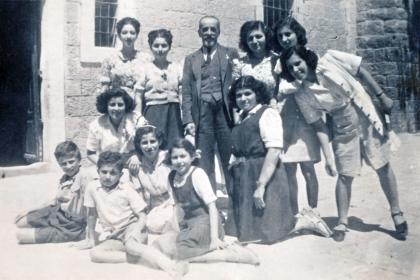
Girls School
Birzeit University began a school for girls in the town of Birzeit that was founded by the educator Nabiha Nasir (1891-1951). The main objective of the school was to provide girls from Birzeit town and the neighboring villages with the opportunity for primary education, at a time when there were no schools in that region. The educator Rateebah Shouqair (1881-1957) was the school’s first principal.
1932
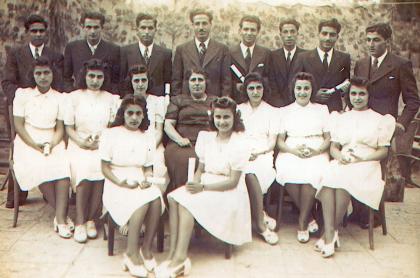
Schoolchildren
In 1932, Ms. Shouqair moved to Beit Jala to establish the Good Shepherd School, now known as the Good Shepherd Swedish School, and became principal of Birzeit School.
In the same year, a boys school was established, headed by Mr. Wadi’ Tarazi. This became Birzeit Secondary School, which included both boys and girls. The school was headed by Musa Nasir (1895-1971.
1942
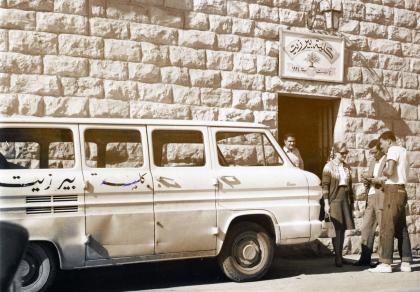
Birzeit College
Birzeit College teachers were divided between boys’ teachers and girls’ teachers. The girls' school was located in the house of the pastor Hanna Nasir, which comprised classes and a dormitory, as well as administration offices. The boys’ school was located in rented houses and buildings in the neighborhood. One of these buildings was used for classes and teachers’ accommodation, and another building was used as residence for boys and a dining hall for teachers and students. Both schools used a third building, which was owned by the Nasir family and was used for public lectures, plays, debates and other activities.
1947
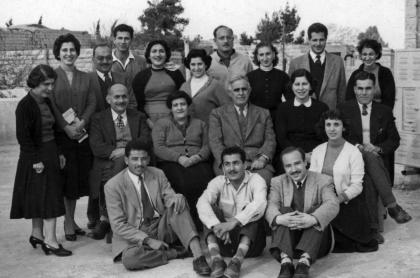
College Voice
In June 1947, the first issue of the College Voice Magazine was published. It was a monthly magazine published in cooperation with the college alumni. It included high level scientific research and articles on social issues. The aim was to offer community service and create an opportunity to train students in publishing their views. After the Nakba in 1948, Birzeit College continued to play its role by hosting Palestinians taking refuge in the West Bank and Gaza Strip.
1953
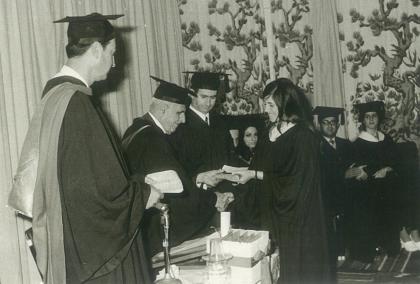
A Freshman Class
Musa Nasir took over the chairmanship of Birzeit University (1859-1971 in 1953 and the freshman class in Arts & Sciences was initiated, followed in 1961 by the sophomore class.
1967
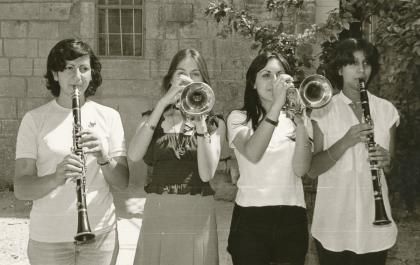
Ending Primary Education
Since Birzeit College was the only institution in the country at that time, it was decided to focus solely on university education. Thus, beginning in 1961, the primary, intermediate and secondary grade classes were cancelled by the end of the academic year 1966/1967 and lessons were restricted to freshman and sophomore classes.
1972
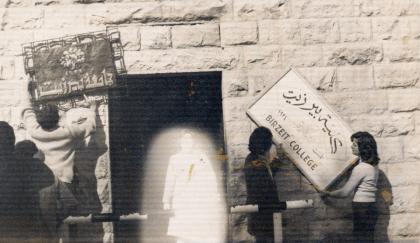
A Bachelor’s Degree & New Campus
Birzeit College continued working on developing its academic offerings. In 1972, it initiated its bachelor's degree programs in Arts and Sciences. The total number of academic programs had reached seven and 200 students were enrolled from all the Palestinian territories. Also, a voluntary work program was started as a requirement for all students of bachelor programs.
Moreover, it was decided to build a new university campus on the outskirts of Birzeit town. This is the current campus. The institution was placed under the supervision of the Board of Trustees, whose members were a number of citizens interested in Palestinian educational affairs, in order to engage the community in bearing the burdens and responsibilities of the institution and to ensure that it fulfills its mission. The board was legally registered, and the founding family that owned the land where the university was located transferred it to the university administration. Tawfiq Abu Saud (1902-1981) became the first president of the Board of Trustees after its registration.
In November 1974, Israeli occupation authorities deported president Hanna Nasir out of the country. In 1975, Birzeit College changed its name to become Birzeit University.
1976
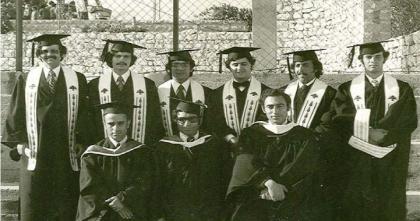
First Batch of Graduates & Joining the Union of Arab Universities
In 1976, Birzeit University celebrated the graduation of the first class of undergraduate students, and president Hanna Nasir, who was exiled to Lebanon, sent a recorded speech on the occasion, saying "When you write the history of science and culture in Palestine, this day will remain shining as a symbol of our determination and the struggle to build a renowned seat of learning, as this day is historical to you and our people, since you are the first cohort to graduate from the first Arab University in Palestine."
At the end of April of the same year, Birzeit University joined the Association of Arab Universities in the meeting held by the Union in Sulaymaniyah, Iraq. The meeting was attended by Hanna Nasir and university dean Gabi Baramki.
During this period, Birzeit launched a pilot literacy and adult education program, acquainting the Palestinian community with its educational role. In April 1977, Birzeit University was the first Palestinian university to join the International Union of Universities.
In 1978, Birzeit University witnessed the founding of the Faculty of Commerce and Economics and the Institute of Community and Public Health. The Faculty of Engineering, which was established in 1979.80's
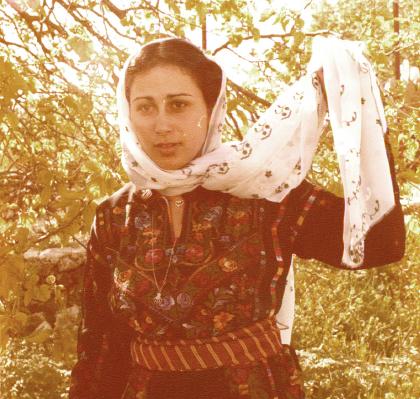
Academic & Urban Development
During the 1980s, the university worked on developing its academic programs and infrastructure, and initiated many academic programs, including the master's program in education (the first graduate program in Palestine), and Birzeit Testing Laboratories.
In 1985, Yusuf Ahmed Ghanem library opened, and in 1989, it began computerizing its office operations.
In the same year, the administration building and Kamal Nasser Hall opened. In his opening address, board chairman Saadi al-Faqih said, “This ceremony aims to honor and commemorate the four great Palestinians who have sacrificed either their lives or money. The Palestinian people shall survive and face all challenges, no matter what. The four men are: Kamal Nasser, who was martyred on April 10, 1973 and Abdul Mohsen Al-Qattan, the generous donor who donated Kamal Nasser Hall. The other two men, Walid Al-Qattan and Zain Mayasi, donated the costs of the administration building."
In 1988, Darwish Nazzal was elected Chairman of the Board of Trustees.
90's
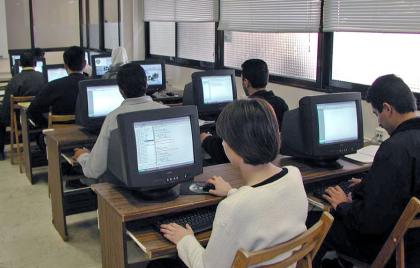
Agreements, New Buildings & Specializations
University president Hanna Nasir returned to the Palestinian territories in April 1993, after spending more than 18 years in exile. He inaugurated the Center for Continuing Education, and opened the Faculty of Commerce and Economics building. In the same year, the Institute of Law and the National Music Conservatory were founded in Ramallah.
At the beginning of the academic year 1993/1994, the university kicked off its Palestine Arabic- Studies Program, which was designed to teach foreign students courses in Arabic, one course on women in Arab society and a course in contemporary Palestinian literature
In 1994, the university launched two institutes, the Ibrahim Abu-Lughod Institute of International Studies and the Institute of Women's Studies.
Graduate programs in education and in international studies were opened. The study focused on topics of scientific research and building skills in conducting scientific research. These programs developed to include law, economics, public and community health, business administration, water engineering, democracy and human rights, contemporary Arab studies, sociology, women, law and development, Arab and Islamic history, an advanced diploma in medical testing, and primary health care.On June 27, 1994, the university signed an agreement with the French government to establish the Institute of Law, in order to develop Palestinian law and lay the pillars of sovereignty, and to respond to Palestinian needs in the legal field. The institute opened on April 27, 1995.
Hanna Nasir was elected on August 2, 1995 as a member of the Board of Trustees and a member of the International Union of Universities representing 800 . Institutions. This was the first time that a Palestinian member was elected.At the beginning of 1996, Birzeit University joined the global online network in order to break the isolation imposed on Palestinians in the field of communications and information transfer.
On June 20, 1996, a radio-training center opened at the university to prepare a professional cadre in media, and to train local radio broadcasters. A vocational training center in printed media also opened on December 4, 1996, aiming to develop the Palestinian press in the foundations of democracy and principles of freedom and openness.
On November 10, 1997, Birzeit University initiated its graduate program in Water Engineering to prepare young leaders to deal with water issues, and to apply technological means to ensure optimum use of water resources.
The Medical Clinic also opened on March 21, 1998 to provide health services to families and university students, faculty members and staff. The Institute of Law opened on October 20, 1998, to unify Palestinian legislation and develop legislative drafting standards, with the support from the Qatari government and the French government
On October 28, 1998, the diploma program in government institutions management opened to support the training of Palestinian institutions, particularly in education.
On December 31, 1999, a language lab was opened at the university to enhance the Department of Languages and Translation services, and to add a new specialty in French language and translationThird Millennium
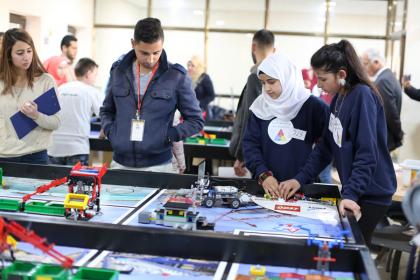
Excellence, Creativity & Continuous Progress
On December 6, 2000, the university opened the Institute of Environmental and Water Studies and the Institute of Graduate Studies (Aziz Shaheen Building). This same year, Saba Arafat assumed the presidency of the Board of Trustees. Ibrahim Dakkak took over the presidency of the Board of Trustees in 2003.
In 2004, Nabil Kassis took over the presidency of the university to succeed Hanna Nasir. Also, the Faculty of Law and Public Administration was founded with the support of the Kingdom of Bahrain. The Institute of Women's Studies and the main library extension were opened.
The Birzeit University Museum was established in 2005.
In 2006, Hanna Nasir was elected chairman of the Board of Trustees. Under his care, the Faculty of Information Technology was founded, and the Physical Education Building (Muhammad Imran Bamieh and Walid Kayyali building) was opened.
The Faculty of Arts (Aziz Shaheen Building) was opened in 2007, along with the Faculty of Nursing, Pharmacy and Allied Health Professions. The Nejjad Zeenni Information Technology Center of Excellence was opened in 2008, and the Said Khoury Building for Development Studies in 2009.
Khalil Hindi assumed the university presidency, succeeding Nabil Kassis in 2010, until 2013.
During this period, the Faculty of Nursing, Pharmacy and Allied Health Professions (Ghalib Younis building), the Faculty of Education (Muhammad Imran Bamieh building), the new Administration building (Walid and Helen Qattan) and Mohammed Masrouji Media Building were opened.
Abdullatif Abuhijleh took over the university presidency from 2015 to 2021.
Birzeit University continued to historically build itself up at this time. The Michel and Sanieh Hakim Observatory was established through a generous donation from Ramez Hakim to provide a unique venue that combines astronomical observation, research, teaching, and outreach. Later that year, the university inaugurated the Samih Darwazeh Institute for Pharmaceutical Industries and the Nasib Aziz Shaheen Auditorium: modern and artistic facilities available to both students and the Palestinian community to further progressive discourse.
In 2016, the foundation stone for the Palestine-India Techno Park was laid, to be built on 20 dunums of Birzeit University land. In 2017, the university inaugurated the Riad Tawfik Al-Sadik Faculty of Law and Public Administration, a new milestone in the university’s evolution.
The university won the prestigious Yasser Arafat Achievement Award for 2018. Also in that year, the university was ranked highly in the QS University Rankings: 38th in the Arab world and in the top 3% of universities worldwide.
In 2019, Birzeit University expanded further by inaugurating four new buildings to support the growth university programs: the Samir Aweidah Building-Faculty of Art, Music, and Design; the Samir Abdulhadi Building (attached to the Mathematics wing of the Faculty of Science); the Omar Abdulhadi Building (an annex to the Faculty of Business and Economics); and the University Services Building, which includes the bookstore, banking services, and other facilities.
As the coronavirus overtook the world in 2020, the university proactively joined the remote learning experience, investing $250,000 into the improvement of its technical capabilities and internet servers. In 2021, the university completed a one-megawatt solar power station, the biggest of seven solar power stations on the university campus.
The university is the top higher education institution in Palestine, according to the 2021-22 University Ranking by Academic Performance.

